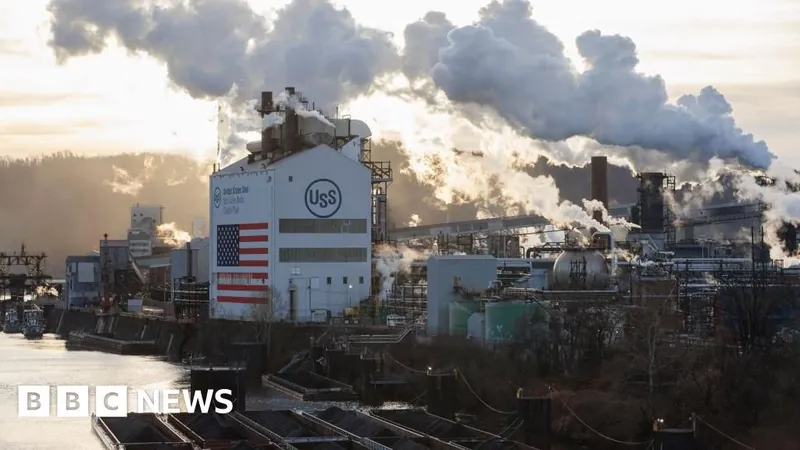
Biden Blocks Nippon Steel’s Takeover of US Steel: What It Means for America and Japan
2025-01-04
Author: Jessica Wong
In a significant economic move, President Joe Biden has officially blocked the acquisition of US Steel by Japan's Nippon Steel, a decision that fulfills a pledge he made during his campaign and could have far-reaching implications for US-Japan relations and foreign investment in the United States.
Citing national security concerns, Biden emphasized the importance of maintaining US control over vital industries. His administration believes that a strong domestic steel industry is crucial not only for economic stability but also for the resilience of American supply chains. This intervention follows pressing calls from the United Steelworkers union, which vocally opposed the merger, framing it as a pivotal issue in the lead-up to the 2024 presidential elections.
The reaction from Japan has been swift and critical. Japanese officials have expressed their disappointment, labeling Biden’s decision as “incomprehensible.” Nippon Steel and US Steel, which had previously hinted at a potential lawsuit against the US government, have voiced concerns that the review process was influenced by political motivations rather than economic rationale. They issued a statement alleging that Biden’s decision risks alienating foreign investors from allied nations.
Yoji Muto, Japan's industry and trade minister, noted the apprehensions among economic circles in both countries and stressed the need for serious consideration of future investments. The deal, valued at approximately $14.9 billion, was initially announced in December 2022 and represented a significant strategic play for both firms.
Biden’s decision raises questions about the future of US Steel, which has struggled for years and remains a vestige of America's once-dominant industrial landscape. The company had been seeking a buyer for an extended period and was banking on Nippon Steel's investment to rejuvenate its operations, especially amid fears that factory closures might ensue without the financial backing an acquisition would provide.
The two companies had proposed various assurances to gain approval, including commitments to maintain jobs and funding workforce training programs. However, these efforts did not sway Biden, who has faced considerable pressure to prioritize domestic industry, particularly with the critical battleground state of Pennsylvania in play for the upcoming election.
This decision has also drawn contrasting reactions from political observers. While some see it as an alignment with protectionist sentiments reminiscent of the Trump administration's 'America First' strategy, others worry that such a stance could inhibit future economic collaboration with Japan—a close ally whose industries have been significant contributors to the US economy.
The Committee on Foreign Investment in the United States, the body responsible for assessing foreign acquisitions, failed to reach a consensus regarding the transaction, placing the final decision firmly in Biden's hands. The president's announcement has mandated that the two companies cease negotiations within 30 days.
While US Steel shares fell over 5% following the news, some analysts suggest that this may not be the end of the story. It is possible that Nippon Steel will re-evaluate its strategy under a different administration after the 2024 elections. Political analysts posit that if Trump returns to office, he may attempt to renegotiate the deal, potentially leveraging better terms to showcase an improved outcome for American workers.
In summary, Biden's decision not only underscores his administration's commitment to domestic economic stability but also poses a challenging conundrum for future US-Japan relations. As global markets react, the coming months will be crucial in determining how this decision will influence international investments and partnerships moving forward.

 Brasil (PT)
Brasil (PT)
 Canada (EN)
Canada (EN)
 Chile (ES)
Chile (ES)
 Česko (CS)
Česko (CS)
 대한민국 (KO)
대한민국 (KO)
 España (ES)
España (ES)
 France (FR)
France (FR)
 Hong Kong (EN)
Hong Kong (EN)
 Italia (IT)
Italia (IT)
 日本 (JA)
日本 (JA)
 Magyarország (HU)
Magyarország (HU)
 Norge (NO)
Norge (NO)
 Polska (PL)
Polska (PL)
 Schweiz (DE)
Schweiz (DE)
 Singapore (EN)
Singapore (EN)
 Sverige (SV)
Sverige (SV)
 Suomi (FI)
Suomi (FI)
 Türkiye (TR)
Türkiye (TR)
 الإمارات العربية المتحدة (AR)
الإمارات العربية المتحدة (AR)